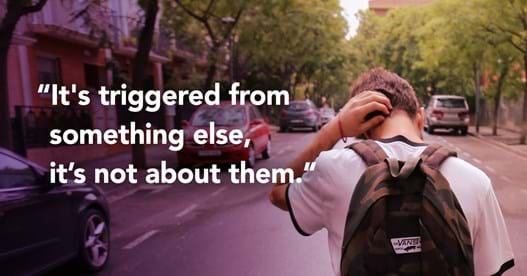THIS is how to keep your teenager safe.

Adolescence is an integral part of life when we develop our sense of self and identity. But it’s often a challenging journey, and the throes of puberty can shake a whole family. This is how you can support your teen even when they don’t want your help.
Author: Pierrette Langford
Puberty is a time of upheaval and discovery, and it’s also when teenagers commonly begin to detach from their parents. Detachment is a normal process and a journey that we all go through, and it’s essential to approach this phase with empathy and compassion. We asked Psychoanalytic Psychotherapist Bernard Macleod, from ‘‘A Place To Talk’’ to explain what’s happening from a developmental perspective during early adolescence:
“As soon as you start hitting early adolescence, explosions go off in the mind, the body and the brain – all three separate things that create massive change. This requires the teenager to do all sorts of things to try and adapt to this new environment. All of these things that are happening, mind, brain and body, are designed to eventually create the adult individual – but it takes a while, and things can get hairy in the meantime.”
– Bernard Macleod

Prioritise your mental health and get support
If your child is withdrawing from you or your family, we strongly recommend taking some time to invest in your own mental health and wellbeing. It’s important both for their sake, but also in order to explore the feelings this may bring up without causing harm. Try to remember that you are the adult in the situation and regardless of how your child may be acting, it’s vital not to respond with anger or frustration.
Even when your child is acting like a jerk, it’s important to remember that they are still human and going through a journey that you may not understand. You needn’t respond in kind; instead try responding calmly, with kindness and empathetic language (e.g., “That sounds frustrating to experience”).
Remember that it’s not about you.
We asked Youth Ambassadors to the Harrison Riedel Foundation, Alex Riedel, and Maddie Huyskens what’s usually running through their minds when they’ve had a bad day:
“[Our emotions] aren’t always directed at our parents. Sometimes it comes out as anger, and we feel bad about getting angry because it turns into a fight or they get upset. What they don’t really understand is that it’s triggered from something else, it’s not about them.”
“What they don’t really understand is that it’s triggered from something else, it’s not about them.”
– Alex Riedel, Maddie Huyskens
Have compassion for yourself.
This is not to diminish how deeply hurtful and upsetting it can be to feel the brunt of hateful emotions from your child. Hearing ‘I hate you’ or ‘I don’t want to talk to you’ can cut straight to the core, and it’s tempting to lash out or act regretfully. That’s why it’s so important not only to hold compassion for your teen but also for yourself. Just like your child is only human, so are you. Conflict within the family can be stressful and traumatic, and feelings that arise deserve to be explored in a safe and supportive environment.
“No matter the reason behind why your teen won’t talk to you, normal teen privacy or a teen caught up in extreme behaviour, you need to keep yourself grounded.
For me, finding others who are going through the same thing helped. It lightens the load as we laugh, vent and cry with each other. It helps us to stay strong and to be there for our teens when they need us – and knowing others are going through similar things helps us not to blame ourselves or get angry at our kids – it is normal behaviour and they’ll get through it.”

Ensure your child has someone safe to share with.
A key motivation behind creating YourCrew was to make sure everyone has a support network to catch them if and when they need it. With your teenager on YourCrew, you can rest easy knowing they’ve got a trusted group of people available if they need support.
“Teachers are great resources. Teachers see these kids operate, socialise, and they see them engage. They’ve often got a really good gauge.”
– Bernard Macleod
Be there when they need you.
No matter what’s going on in your teenager’s life, they need to know how much you love and care for them. Puberty can be a confusing phase to navigate, and your child needs to know you’ll be there for them, waiting on the other side.
Depending on your circumstances and your child’s age, it could be a good idea to sit down with them and discuss your relationship. Perhaps there are issues that you aren’t aware of that could easily be resolved. Asking your child to discuss your relationship will, at the very least, let them know that you’re willing to listen, learn and that their input is valued.
“The child’s on a journey, and it’s not a journey they are necessarily in control of, but, it’s a journey we all go through. Find a distance where you can keep them safe, but let them separate.
Remain calm, remain present, remain available.”
– Bernard Macleod